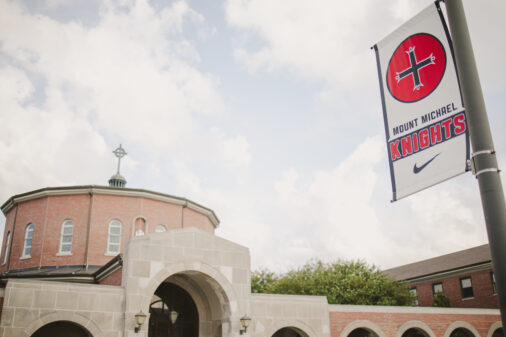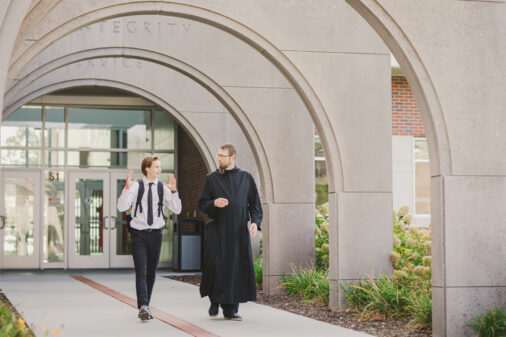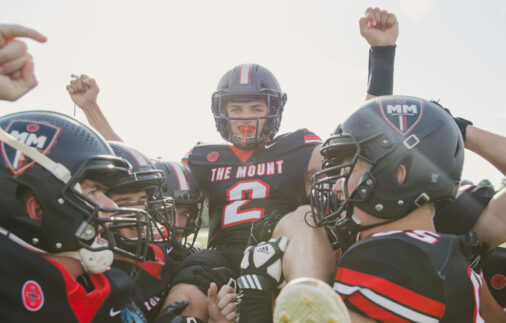-
About
About our School
At Mount Michael the core of the academic program enables students to become inquiring learners, appreciative of their heritage, responsive and committed to the challenges of the future.

-
Admissions
Admissions
Mount Michael Benedictine School admits students of any race, color, national and ethnic origins to all the rights, privileges, programs and activities generally accorded or made available to the students.

-
Academics
Academics
Ultimately, it is our goal to enable every student to reach his educational and career potential.

-
Counseling
Counseling
The Mount Michael Benedictine School Counseling program is a comprehensive counseling program dedicated to nurturing our students, families, and community.

-
Spirituality
Spirituality
Benedictine values encompass a broad range of concepts that are central to life within a Christian community. It is quite possible to literally perceive dozens of values that can be deemed as Benedictine in nature. This a testimony to the breadth of “The Rule” and communal life established by Saint Benedict.

-
Activities
Activities
There are many opportunities for students to get involved at Mount Michael. Some are competitive, some are participatory. In either case it is all part of getting a well rounded educational experience.

-
Athletics
Athletics
There are many opportunities for students at Mount Michael to participate in our top of the line athletic programs. Go Knights!

-
Advancement
Advancement
Under this tab you will find links to Mount Michael giving opportunities as well as information about fundraising events.

Mathematics
Mathematics
Students must take 10 credits of Math each year. Expand the bars below for a full description of each Mathematics course and the credit hours.
An introduction to real numbers. The operations, functions, subsets, and properties of the real numbers are studied. Topics include: Patterns in numerical sequences, algebraic operations, equations, proportional reasoning, statistics, linear functions, inequalities, absolute value, systems of equations and inequalities, exponents and exponential functions, polynomials and factoring, quadratic functions, rational functions, radicals, coordinate geometry, probability, functions, and transformations.
Full year; 10 credit hours
Traditional topics are covered including geometric figures, reasoning and proof, congruent triangles, proportions and similarity, right triangle trigonometry, measurement, and coordinate geometry.
Full year; 10 credit hours
Prerequisite: Algebra I
This course is a second-year algebra course, which enhances the topics covered in Algebra I and introduces new concepts. Students will learn how to apply algebraic concepts such as complex numbers, polynomials, conic sections, logarithms, matrices, and trigonometric concepts. Students will use realistic and relevant problem-solving skills as well as utilizing connections from other curriculum areas.
Full year; 10 credit hours
Pre-Calculus is the study of functions and related topics that are necessary for the preparation of Calculus. There will be an emphasis on function transformations and mathematical modeling, and a strong base in Trigonometry will be provided. Students will use realistic and relevant problem-solving skills as well as utilizing connections from other curriculum areas.
Full year; 10 credit hours
Prerequisites: Algebra II and Geometry
This is a senior course that utilizes the importance of functions in real-life applications and enhancing existing algebraic skills. Students will be expected to identify basic functions (such as polynomial, rational, exponential, logarithmic) and determine the effect changes of transformations have on these functions. There will be an emphasis on representing functions graphically, analytically, and numerically. At the conclusion of the course students should be able to communicate mathematics more effectively and have the necessary algebraic foundation to make the transition to college.
1 semester; 5 credit hours
Prerequisites: Algebra II and Geometry
This is a senior course that incorporates the concepts of algebra and geometry in understanding trigonometric functions. Students will learn the role the unit circle plays in defining trigonometric functions; how to find the amplitude, period, phase shift, and mean value of the six trigonometric functions as well as graph them; how to apply the Law of Sines and Cosines; how to verify a given identity; and how to convert between polar and rectangular coordinates.
1 semester; 5 credit hours
Prerequisite: College Algebra
AP Calculus introduces students to differentiation, the method used to determine the slope of a function at any point along the function; and integration, the method by which the area bounded by a function can be determined. The course requires that students have Algebra I, Algebra II, Geometry, and pre-Calculus as preparation for the course. Students enrolled in the course are required to take the AP Calculus exam at the end of the second semester. Class meets five days per week. Class time is allocated for presentations, problem solving exercises, demonstrations, exercises requiring the use of a graphing calculator, and computer-based exercises.
Full year; 10 credit hours
Prerequisite: Pre-Calculus
This is a senior level class for Students who have already passed AP Calculus. Topics covered will include Sequences and Series, non-Cartesian coordinate systems (including polar and spherical), Vector Calculus, and special Integration techniques (including integration by parts, along with double and triple integrals). This course will be fast paced and will cover topics through Calculus III at most universities. Students may elect to take AP Calculus BC exam after the second semester. Students may also elect to retake the AP Calculus AB exam or take no AP exam.
Full year; 10 credit hours
Prerequisites: AP Calculus I
Personal Finance is a senior class which will help students prepared for financial responsibilities after graduation. This course will focus on budgets, short and long-term savings plans, investment options, and advantages and disadvantages of debt, with special emphasis on credit cards.
1 semester; 5 credit hours
Statistics is the high school equivalent of a one semester, introductory college statistics course. In this class, students develop strategies for collecting, organizing, analyzing, and drawing conclusions from data. Students design, administer, and interpret results from surveys and experiments. Probability and simulations aid students in constructing models for random behavior. Sampling distributions provide the underlying logic for confidence intervals and significance tests. Students use a TI-84 or TI-Nspire graphing calculator and online applets to analyze data, investigate statistical concepts, and perform inference. Use of statistical software is demonstrated and examples of output from statistical software are provided for students to interpret throughout the course. Students are required to prepare frequent written analyses of real data to develop effective statistical communication.
Full year; 10 credit hours

